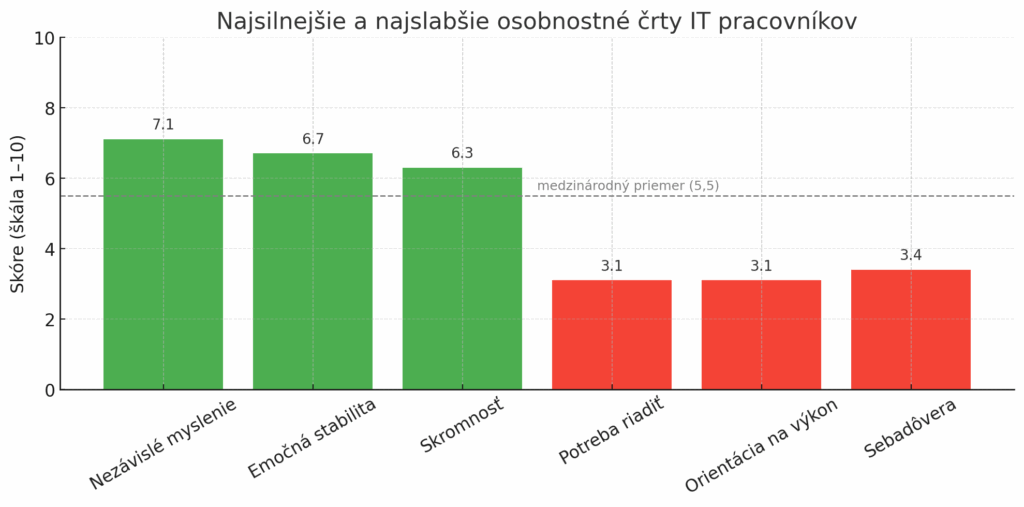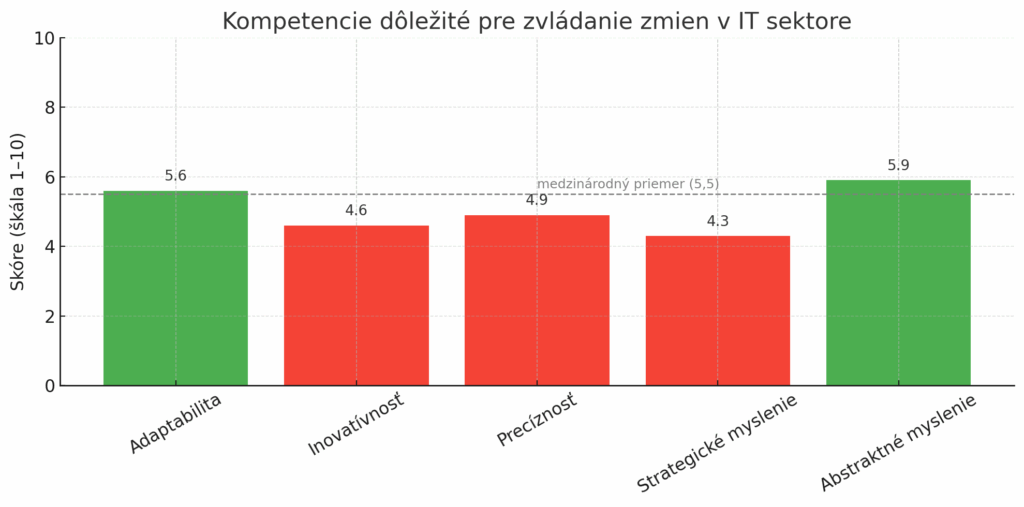As part of the Digital Counsellor project , we used the internationally renowned psychometric questionnaire SHL Occupational Personality Questionnaire (OPQ), which assesses the working styles of employees in detail. The aim was to help project participants understand their strengths and development sides so that they can make better career decisions and benefit from targeted coaching. The article provides an overview of findings that can help employers better understand what dominant characteristics people in the IT and Telecommunications (ITaT) sector have and how to support their development. Employees can use this information to identify areas of their development and better prepare for the current changes in the labour market.
Workers involved
The questionnaire was completed both by people who are aware of changing labour market conditions and are still vaguely considering further career steps and by those who have already lost their jobs. The survey was carried out on a sample of 442 people. They were all from the ITaT sector. Although this is not a representative selection, the results provide a valuable picture of what work styles and personality traits prevail among this part of the workforce.
How the test works and what it measures
The OPQ questionnaire evaluates personal and work characteristics. The results are divided into different areas of behavior that show how people usually work, communicate, or react in different situations, such as autonomy, stress management, and openness to change. Each trait is evaluated on a scale from 1 to 10, where values around 5.5 represent average values compared to the international norm of the population. A higher score means a stronger manifestation of a given trait, a lower one means a weaker one.
The most common features: independent, calm and unobtrusive
Among the features that achieved the highest average values across all groups of respondents, ITaT workers were dominated by 3 areas: independent thinking, emotional stability and modesty. The average score for independence was 7.1, indicating that most testers prefer autonomy and autonomy in decision-making, which can be beneficial in solving complex tasks and in innovation.
The second strength was the ability to manage emotions and keep calm even in difficult situations. Emotional stability (6.7) can be an advantage especially in teams working under pressure or in a dynamic project environment.
The third distinctive feature was modesty, with an average score of 6.3. Many respondents do not seek active self-representation, which can be a positive manifestation of humility in the team. On the other hand, this feature can make their professional achievements less visible – a risk especially in a competitive environment.
Weaker features: less management, less enforcement
At the other end of the scale, there were features with the lowest average values: the need to manage and focus on performance – both with a diameter of 3.1 and self-confidence with a value of 3.4.
A lower need to manage suggests that respondents prefer expert or support roles where strong enforcement is not necessary. Lower performance orientation, in turn, shows a preference for stability and realistic expectations over aggressive achievement of goals. These findings are not a weakness. However, they draw attention to the need to properly adjust the working environment to allow these employees to effectively use their potential.
However, these results should be interpreted with caution. Lower ambition and self-confidence can be influenced by the composition of the sample – especially among the unemployed or those in transition who may experience lower motivation or self-confidence.

Important for managing change: Adaptability, innovation and consistency
Rapid technological developments, the advent of artificial intelligence and automation are placing ever-increasing demands on workers in the ITaT sector for adaptability, creativity and precision. The average level of adaptability tested was 5.6, indicating that most participants are able to respond to changes and adapt to new situations.
On the contrary, the average scores for innovation (4.6), systematicity and precision (4.9) and strategic thinking (4.3) show that there is significant scope for development in these areas. Respondents may need targeted support and training to effectively come up with new solutions and increase their precision and strategic thinking – key competences in the IT sector. However, abstract thinking (5.9) came out positively, which is a strength in analyzing complex systems or working with data.

Ability and willingness to learn: Prerequisites are, motivation fluctuates
Test results show that participants from the ITaT sector are well placed to develop – mainly due to their ability to think abstractly (5.9), their slightly above-average adaptability (5.6) and their openness to new experiences (5.1). These features are important for the successful acquisition of new knowledge and skills. On the other hand, there appears to be weaker internal motivation to develop (3.1), weaker strategic thinking (4.3) and low competitiveness (4.1). Many of them may lack the natural impetus to actively seek out learning opportunities. A well-designed environment, goals and support that can activate learning ability are therefore essential for successful growth.
The Quiet Expert: Strong in thought, weaker in assertion
The combination of high scores in areas such as independent thinking (7.1), emotional stability (6.7) and abstract thinking (5.9), along with low performance orientation (3.1), competitiveness (4.1), decisiveness (4.3) and assertiveness (3.4), indicates the occurrence of a specific profile: The silent expert. It is a person who possesses intellectual potential and psychological resilience, but at the same time does not naturally assert himself, does not seek competition and is not motivated by external pressures. Such a profile can be overlooked in a traditionally set work environment. At the same time, however, it can be very valuable if the organization creates conditions for it, where it will not be necessary to assert itself by force, but professional quality and autonomy will be appreciated.
What does that mean?
The results of testing with the OPQ personality questionnaire provide a useful picture of the personality profile of people from the ITaT sector who are affected by changes in the labour market. They show that many of them have internal stability, autonomy and ability to manage stress, but at the same time they may need support in increasing self-confidence, ambition or developing strategic thinking and a creative approach to work.
This is an opportunity for employees to better understand their own assumptions and to build on them in a targeted way – be it when changing jobs, continuing education or personal growth. It is an opportunity for employers to better tailor development programmes, coaching and leadership styles to the needs of people facing the challenges of transition in the labour market.
Test yourself too.
Are you interested in the results of internationally renowned testing and want to find out how you or your employees are doing? We bring this opportunity to you again as part of the continuation of the Digital Counsellor project. The service is reimbursed from EU funds and the number of places is limited, so we recommend registering as soon as possible. More information and registration can be found at www.digitalnyradca.sk.
Source: European Digital Skills & Jobs Platform


